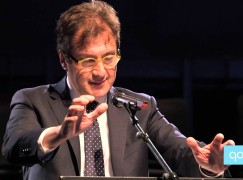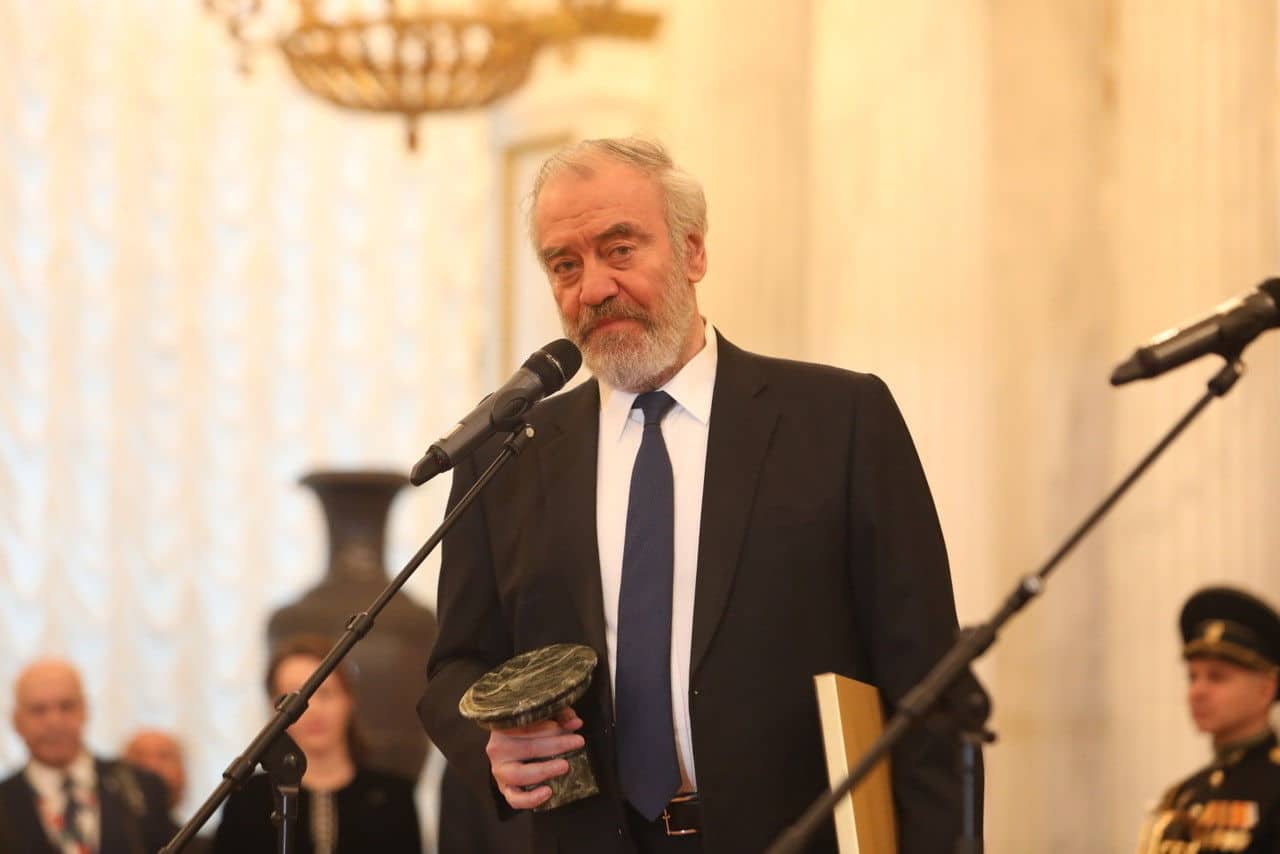Dresden justifies Dorny’s dismissal
mainThe Saxon minister of culture spoke to Parliament today about the reasons she sacked Serge Dorny as intendant of the Semper Oper before he could start work. Nothing to do with music director Christian Thielemann, she stipulated.
She accused Dorny of presenting her with a series of ‘all or nothing’ ultimata. That’s no way to run a state opera, she concluded.
Auf Deutsch: «Wenn jemand mit einer Option “Alles oder Nichts” an mich herantritt und diese mit unangemessenen und unrealistischen Forderungen und Fristsetzungen verbindet, dann spricht dieses Vorgehen meines Erachtens für sich selbst».






These sort of all-or-nothing demands are not terribly unusual in Germany’s most important houses. They usually represent an initial stance that through negotiation is altered to meet practical realities. Germany, much to its credit, even takes a kind of pride in this view of the absolute sanctity of art. I would say that in some cases, these kinds of pronouncements are even expected, even if more for a show of idealism than substance. France has a similar practice, and Dorny was also known for such grand statements in Lyon – something that Sabine von Schlorlemer must have known. And yet he adapted to the realities.
Seen in this light, the firing seems a bit odd. I notice that von Schorlemer isn’t saying very much about what efforts were made toward compromise.
Trouble has followed Thielemann in many places he has worked – his conflicts with Barenboim and city officials in Berlin, his disputes with city officials and the orchestra in Munich, and the way he abruptly replaced Fabio Luisi in Dresden. Hard not to think he might have had a hand in this. Conflicts between the General Music Directors and the Artistic Directors of opera houses are not uncommon. A good example was the conflicts between Wolfgang Sawallisch and August Everding at the Munich State Opera.
Thielemann did not “abruptly replace Fabio Luisi in Dresden.” Luisi announced he was not going to renew his contract with Dresden because he was going to Zurich. Dresden, appropriately, began a search to replace Luisi after his contract expired and hired Thielemann as Principal Conductor of the Staatskapelle to begin after Luisi’s contract expired. And that’s what happened.
The fact that Luisi walked out on his contract with Dresden before it ended — leaving the company scrambling to find conductors for numerous operas and concerts, including some RING cycles—is something Luisi chose to do. He certainly was not “abruptly replaced” by Thielemann who began his position in Dresden some time later.
Events point to a picture not quite so clean. Luisi resigned from his Dresden post in February 2010, with immediate effect, after reports that the Staatskapelle’s management had secured a contract with the ZDF network for a scheduled televised concert on New Year’s Eve, 2010 with Christian Thielemann as conductor, without consulting Luisi at all in his capacity as the orchestra’s GMD.
A more complicated picture is also described here:
http://intermezzo.typepad.com/intermezzo/2010/02/fabio-luisi-resigns-suddenly-from-dresden.html
Funny how these messy situations and sudden departures (both Dorny and Luisi) seem to follow Thielemann around. Apparently he is just a magnet for coincidences.
“Funny how ….”
Funny how Mrs Schorlermer accused Diorny of EXACTLY what he’s been doing for 10 years in Lyon… Just a coincidence, for sure….
Yes, and the local politicos are asking why she invited him and gave him the highest salary of any house director in Germany if she weren’t willing to deal with his style. Makes it seem a bit like she wasn’t the the one who had the big problem with Dorny.
Or maybe he promised he would try to co-operate with Thielemann – who, obviously is known for being difficult to work with – but then once he had the job, he adopted a “I am the new boss, I will show him” stance which led to a direct collision with Thielemann? I am not saying that is what happened, but that seems to be a possible scenario, too.
Everyone in this affair seems to concentrate on the Thielemann issue, which is only Dorny’s poor defense of his firing. There are many other things that most probably didn’t please Mrs Shorlemer even though she didn’t get into all the details of his “Sun-King attitude”. Maybe she should give more examples. For one, is it true that even before starting the job he fired (or tried to) 2/3 of the chorus and the chorus master ? How many other people (besides Thielemann, and those I just mentionned) were on Dorny’s ‘little list” ?
“Yes, and the local politicos are asking why she invited him and gave him the highest salary of any house director in Germany if she weren’t willing to deal with his style.”
Which seems a perfectly valid question. But maybe she realized she had made a mistake, and amended it before the ruins were too advanced.
Even more funny how nobody here in Germany had the faintest idea of what was going on in Lyon, obviously including those still anonymous commission members who choose SD in the first place. Without reading this blog I would probably still have to ponder about which side to believe. In the parliament debate quoted here Mrs. Schorlemer was also reproached for asking nobody at Lyon, and it appears that she had little to say to her defence in this regard.
But it also appears that the story is over for her at this point anyway. Gossip has it that no steps towards choosing another intendant will be taken anymore before the state elections take place on 31 Aug, and gossip also has it that Mrs. Schorlemer does not strive for another term of office. So someone else will have to deal with this mess.
Concerning your questions: Yes, the chorus master has been fired and reportedly leaves to Italy. Here gossip has it that the chorus master from Lyon was supposed to replace him. Now this is yet another vacant position. And regarding the mentions of two thirds of singers being fired: This concerns the cast of soloists which all had been summoned to an audition, including bedrocks honoured with the title Kammersänger. This occurance caused much uproar, and initially it was quite unclear how to deal with these firings which, as it seems, have not just been attempted but were indeed valid.
Meanwhile they have committed themselves to tickets for the 2014/15 season being available when the box office opens on 28 March, which means that details have to be released in ten days at the latest. Needless to say that this time it will be a particularly interesting announcement.
I refer you to the opening paragraph of the intermezzo piece you link:
“Although it was announced last year that Luisi would be leaving to become chief conductor of Zurich Opera from 2012, it was initially expected that he would see out his contract with Dresden until the new chief conductor Christian Thielemann takes over in two years’ time.”
Thielemann did not take over until the original time of Luisi’s contract had run its course. That’s hardly “abrupt” as your original post claims.
Thielemann was part of the events that led to Luisi’s abrupt departure, and the negotiations for Thielemann to replace Luisi began soon afterwards. Smells to me.
I’m often with you, but can you expand on “Thielemann was part of the events that led to Luisi’s abrupt departure”? This doesn’t jive with what was going on in Thielemann’s career during those months.
Just the simple observation that Thielemann performed the New Years Concert and that Luisi as GMD was not consulted about this important, high profile guest performance. This justifiably angered Luisi and he left — though there were likely other simmering issues. Not long afterwards T. began negotiations for his job.
Ironically, one of the reasons T. left Munich is that he was not given full control over who guest conductors would be. Apparently what’s good for the goose ain’t good for the gander. Many interpretations of all this are possible. All I can say is that for me personally, it smells.
Well, it was “all or nothing”, he got nothing. How dares he now sue the State of Saxony ?
Bottom line: When Ulrike Hessler became Dresden’s Intendant she pulled the coup of all time and convinced Thielemann to come to Dresden. In turn great things began to happen, one of which Dresden was chosen to be the New Year’s Eve telecast instead of Berlin, the orchestra was chosen for the Salzburg Easter Festival and so many other big and great things, because Hessler (RIP) had the foresite and the insider knowledge and right relationshps. And let us not forget that while it is not the deciding factor Herr Thielemann is very Deutsch, while the honorable Maestro Luisi is not, making him less appealing to the orchestra, so no tear were shed on either side.
And let us not forget that while it is not the deciding factor Herr Thielemann is very Deutsch, while the honorable Maestro Luisi is not, making him less appealing to the orchestra
That’s total nonsense. The principal conductors of the orchestra before Luisi were Dutch, Italian again, Dutch again, Swedish, Czech – you have to go back almost 40 years to find the last German (Sanderling) in that position. So – total nonsense.
Not really. Over the last 20 years, there has been a reemerge of national pride in Germany that began when the wall came down. I think T. has appealed to that sensibility. I can only speak very subjectively, but Dresden seems to have focused a bit on this new sensibility and the cultural dialog that has ensued.
An example might be the Dresden Sinfoniker’s performance of settings of songs by Rammstein re-composed by Torsten Rasch. These are extraordinary compositions are drenched in frightening ironies. Readers can listen to a couple of them here:
https://www.youtube.com/watch?v=YLXgOqA1Mb0
https://www.youtube.com/watch?v=-saw_CkEMDE
Information about Rammstein and the controversy about the band can be found here:
http://en.wikipedia.org/wiki/Rammstein
Here is the translation for “Mein Herz Brennt.” I leave it to the readers to contemplate possible metaphorical meanings.
Now, dear children, pay attention *
I am the voice from the pillow
I have brought you something
I ripped it from my chest
With this heart I have the power
to blackmail the eyelids
I sing until the day awakes
a bright light on the heavens
my heart burns
They come to you in the night
demons, ghosts, black fairies
they creep out of the cellar shaft
and will look under your bedding
Now, dear children, pay attention
I am the voice from the pillow
I have brought you something
a bright light on the heavens
my heart burns
They come to you in the night
and steal your small hot tears
they wait until the moon awakes
and put them in my cold veins
Now, dear children, pay attention
I am the voice from the pillow
I sing until the day awakes
a bright light on the heavens
my heart burns
My heart burns
An earlier version of the song was much more brutal and included the following lines:
Now, dear children, pay attention
I am the voice from the pillow
I have brought hair for you
I bit them off of the sandman
I wear it, because you were bad
I robbed him of hair with skin
I bit off the bloodsmeared beard
and tossed it on my bald head
And the relevance of these words to alleged “reemerging German pride” are in which lines exactly?
Hair bitten off the Sandmann? Now that’s a complicated metaphor for German pride. 🙂